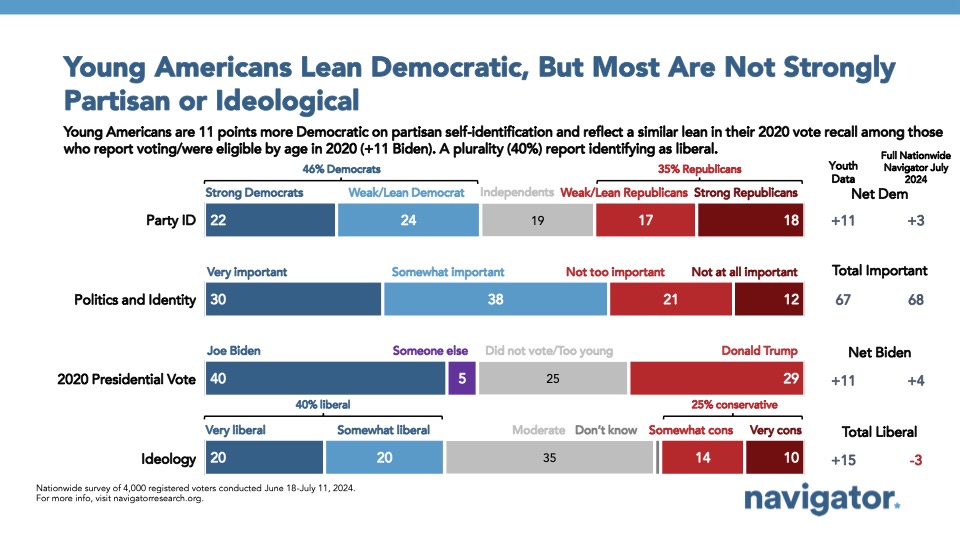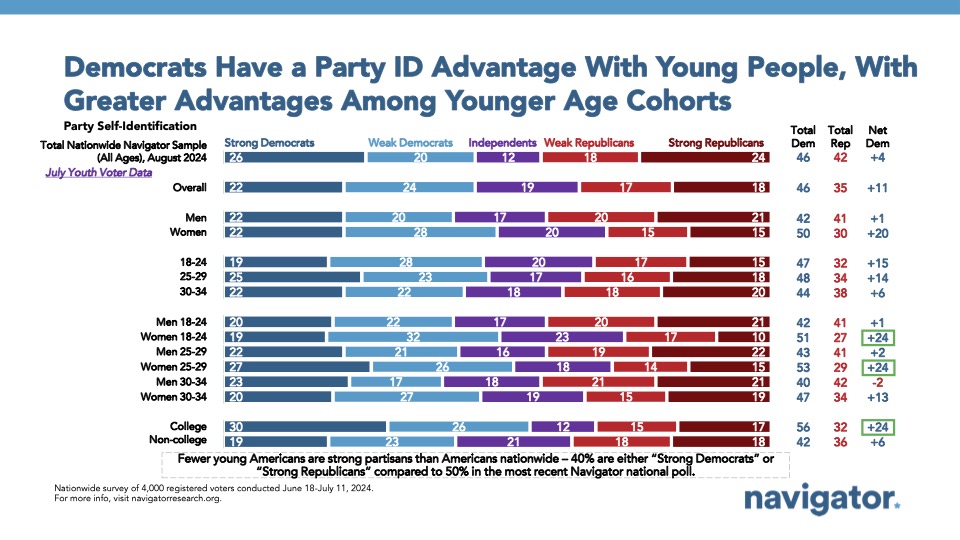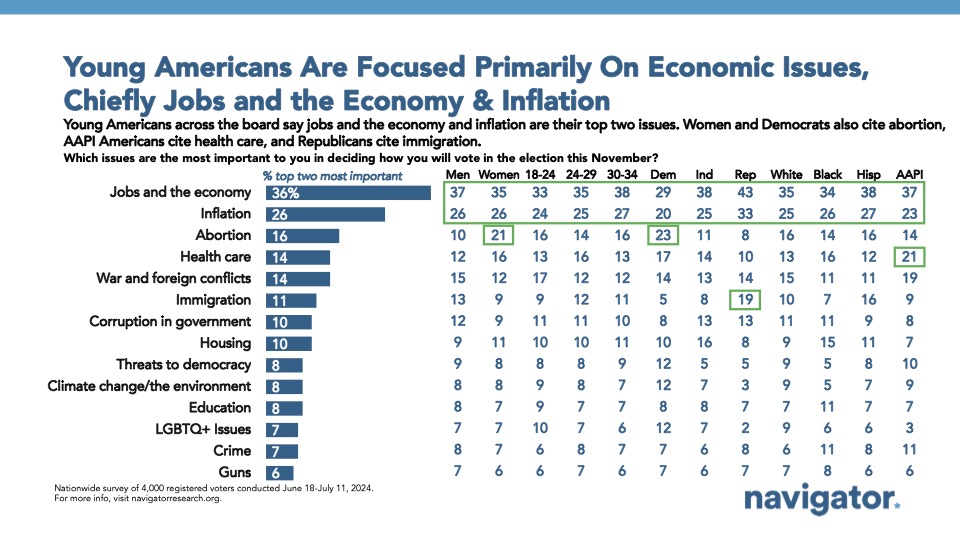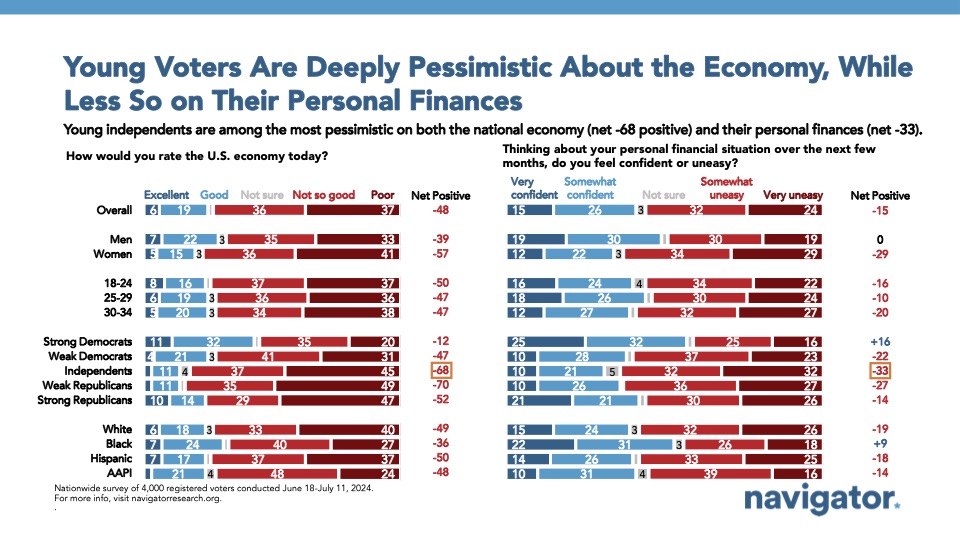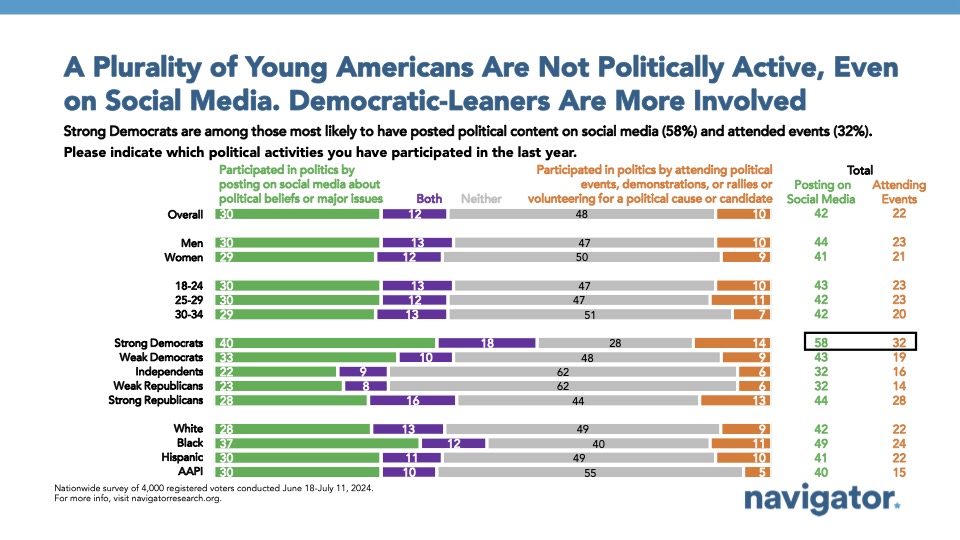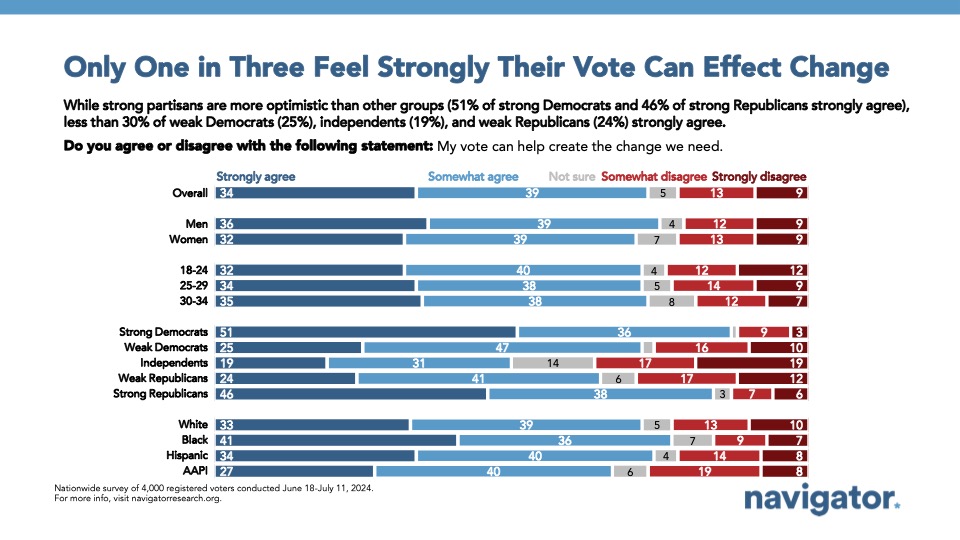Poll: A Political Profile of Young Americans
This Navigator Research report is the first release from a new survey conducted among 4,000 Americans under the age of 35 across five different modes to understand where they stand on issues facing the nation today. Today’s release is a profile of their political party and ideological affiliation, what they consider to be their top issue priorities, their perceptions of the economy, and how they engage in civic activity.
Young Americans self-identify more as Democrats, but most are not strongly ideological or partisan.
Younger Americans lean Democratic; however, smaller shares are “strong Democrats” compared to Americans nationwide. By an 11-point margin, more younger Americans self-identify as Democrats (46 percent Democrats – 35 percent Republicans), which is significantly larger than the national margin (46 percent Democrats – 42 percent Republicans). A smaller share of younger Americans identify as “strong Democrats” (22 percent) or “strong Republicans” (18 percent) compared to the country overall (26 percent “strong Democrat”, 24 percent “strong Republican”).
- Among younger Americans, women are more likely to be Democrats by 20 points (50 percent Democrats – 30 percent Republican) compared to men, who are evenly split (42 percent Democrat – 41 percent Republican). Younger Americans who have a college degree are more likely to identify as Democrats (56 percent) compared to those who do not have a college degree (42 percent).
- Younger Asian Americans and Pacific Islanders (58 percent) and Black Americans (57 percent) are most likely to be Democrats as compared to Hispanic Americans (46 percent) and white Americans (43 percent). Further, white men (40 percent Democrats – 45 percent Republican) and Hispanic men lean slightly more Republican (40 percent Democrat – 43 percent Republican).
- Younger Americans who identify as LGBTQ+ lean strongly Democratic by 46 points (62 percent Democrat – 16 percent Republican), as do Americans who live in urban areas (53 percent Democrat – 27 percent Republican). Those living in rural areas identify as Republican by 16 points (30 percent Democrat – 46 percent Republican).
- Overall, more young Americans identify as liberal (40 percent liberal – 24 percent conservative), with one in five who say they are “very liberal” (20 percent) and just 14 percent who identify as “very conservative.”
Jobs and the economy and inflation are the top priorities of young Americans.
Similar to Americans overall, jobs and the economy and inflation are the two most important issues among young Americans, with overwhelming majorities feeling pessimistic about the state of the economy. The primary issues prioritized by young Americans include jobs and the economy (36 percent) and inflation (26 percent), followed by abortion (16 percent), health care (14 percent), and war and foreign conflicts (14 percent each). A higher share of younger Democrats prioritize abortion (23 percent) while a higher share of younger Republicans prioritize immigration (19 percent, compared to 11 percent of all young Americans). Additionally, younger women are more likely to prioritize abortion (21 percent) compared to younger men (10 percent).
- Just one in five young Americans rate the economy positively (net -48; 25 percent positive – 73 percent negative), with nearly two in five rating the economy as “poor” (37 percent). However, two in five feel at least somewhat confident about their personal financial situation over the next few months (net -15; 41 percent confident – 56 percent uneasy). Uneasiness is concentrated among women (net -29), self-reported weak Republicans (net -27), and white Americans (net -19). Conversely, higher levels of confidence are concentrated among strong Democrats (net +16), Black Americans (net +9), and men (net even). Younger independents are most likely to feel the most pessimistic regarding the state of the economy (net -68) and uneasiness in personal finances (net -33).
Nearly half of young Americans are not politically active, even on social media.
Social media is the most common way young Americans engage with news, but pluralities do not participate in political activities and only one in three strongly feel their vote can effect change. Three in ten young Americans participate in politics by posting on social media about political beliefs or major issues (30 percent), with one in ten who report attending political events and demonstrations or volunteering (10 percent). However, nearly half do not participate (48 percent do not participate). Strong Democrats are more likely to post on social media or attend events (58 percent posting; 32 percent attending events) when compared to strong Republicans (44 percent posting; 28 percent attending events) and independents (32 percent posting; 14 percent attending events).
- Three in four young Americans agree with the statement that “my vote can help create the change we need” (73 percent), though only one in three “strongly” agree (34 percent). 87 percent of strong Democrats “strongly” agree their vote can effect change compared to just 46 percent of strong Republicans who feel the same.
- Black Americans are most likely to feel that their vote can strongly affect change (41 percent), compared to Hispanic Americans (34 percent), white Americans (33 percent) and Asian Americans and Pacific Islanders (27 percent).

